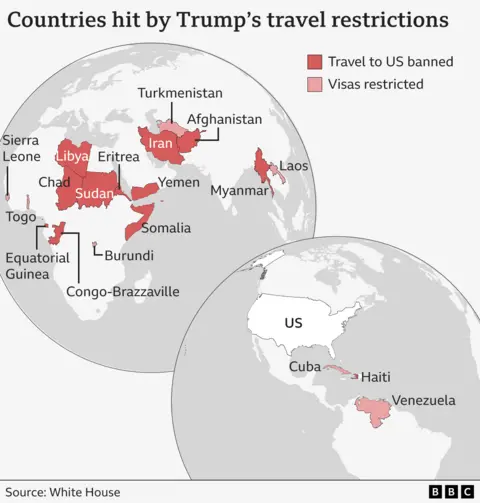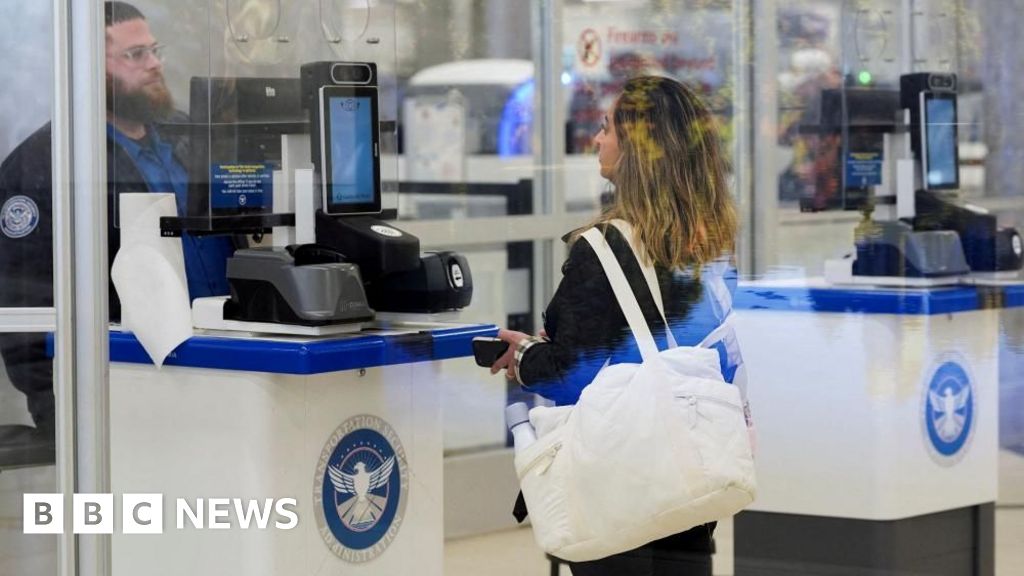What we know
BBC News
Donald Trump signed a ban on traveling to the United States from 12 countries, citing the dangers of national security.
There are also seven additional countries whose citizens will face partial restrictions on travel.
The US President said that the list could be reviewed if “material improvements” were made, while other countries can be added as “threats that appear all over the world.”
This is the second time that a ban on traveling from some countries has been asked. He signed a similar thing in 2017 during his first term.
What are the affected countries?
Trump has signed a declaration prohibiting travel to the United States from citizens of 12 countries:
- Afghanistan
- Myanmar
- Chad
- Congo-Brazaville
- Equatorial Guinea
- Eritrea
- Haiti
- Iran
- Libya
- Somalia
- Sudan
- Yemen
Citizens of these countries will not be allowed to enter the United States unless they are eligible for an exemption.
There are seven additional countries whose citizens face partial travel restrictions:
- Burundi
- Cuba
- Loser
- Sierra Leone
- Togo
- Turkmenistan
- Venezuela
Those who are subject to partial restrictions will not be able to travel to the United States with certain visits.
The embargo falls into force on Monday at 00:01 EST (04:01 GMT), a pillow that avoids the chaos that was revealed at American airports when a similar measure entered without any notice eight years ago.
No end date was provided. The request calls for a periodic review.

Why was the ban announced?
The White House said that “the restrictions of common sense” will protect the Americans from the dangerous foreign actors. “
In a video clip posted on his social website, Trump said The last alleged terrorist attack in Bulder, Colorado “Emphasized the severe risks” offered by foreign citizens who have not been properly examined. “
Twelve people were injured in Colorado on Sunday when a man attacked a group of an Israeli hostage, threw two burning devices and used temporary flame bombs.
The man accused of carrying out the attack was identified as an Egyptian citizen, but Egypt is not included in the list of banned countries.
Trump has close relations with Egyptian President Abdel Fahia Al -Sisi, who was described by the American president in the past as “his favorite dictator.”
There are only two of the 19 countries in the state sponsors list in the United States -Iran government, which has a full prohibition and Cuba, which faces partial restrictions on travel.
But national security is given as a partial cause of options.
In the advertisement, Trump said that many of its listed countries “a historical failure to accept their removable citizens” from the United States, as well as “benefit” from the United States by exploiting its visa system.
He added that citizens from some countries “are great risks” to overcome their visas.
The World Cup players allowed – who is the last exempt?
There are a number of people from affected countries who may still be able to enter the United States due to a number of exceptions. The demand does not apply to:
- “Permanent legal” American population
- The individuals of their direct families who hold migrant visas
- US government employees with special immigrant visas
- Adoption
- Double citizens when the individual does not travel on a passport from one of the affected countries
- Afghan citizens carry private immigrant visas
- Owners of “immigrant visas for ethnic and religious minorities facing persecution in Iran”
- Foreign citizens travel with some non -immigrant visas
- Mathematics and their teams (including coaches and supporters) and their direct family when traveling to major sporting events, such as Men’s FIFA FIFA FIFA FIFA FIFA FIFA FIFA FIFA FIFA FIFA World Cups
In addition, the US Secretary of State may grant exemptions to individuals on the basis of “the case of each case”, if “the individual serves a national interest for the United States.”
What is the reaction to the ban?
Trump’s latest order, which is expected to face legal challenges, is a quick response, at home and abroad.
Somalia promised to work with the United States to address any security issues, with the US ambassador, Daher Hassan Abd, saying that his country “appreciates its long relationship with the United States.
Interior Minister of Venezuela Diosadado Capello warned that “presence in the United States is a great danger to anyone, and not only for Venezuelan.”
The African Union, which represents all 55 countries on the continent, called on the United States to “engage in a constructive dialogue with the countries concerned.”
The United States appealed to its right to protect its borders and the security of its citizens “in a balanced and evidence -based way and reflects the long -term partnership between the United States and Africa.”
Al -Ittihad said it remained concerned about “a possible negative impact of such measures.”
Democrats were quick to condemn this step.
“This ban, which expanded the Muslim ban of Trump in his first term, will be isolated only on the global stage,” wrote Permela Javal, a member of the Democratic Congress in Washington, on social media.
Another Democrat, a member of Congress, Don Bayer, said Trump “Khan” is like the founders of the United States.
Human rights groups also criticized the ban.
Amnesty International described it in the United States of America as “discriminatory, racist and harsh”, while the United States -based human rights described it as “another anti -immigrant and punishment” humanitarian action “by the president.
But others support the ban.
Congress member Clay Higgins from Louisiana said that traveling to the United States was “a privilege, not really.”
On the BBC radio program today, he claimed that the Americans “had enough immigrants coming to our country, violating our laws and committing violence between our people.”
Greg Swinson, president of the Republicans abroad in the United Kingdom, said that the list of countries under the travel ban proves that the White House uses a “policy of proper sense”, but he expressed his empty that Egypt was not included.
“I think what the president decided is that Egypt, although there is a specific incident of an illegal immigrant, may have some policies in a better place than other countries,” he said.
How do you differ in the last time?
The original Trump was banned in 2017, during the first White House term, and participated in some countries itself, such as his last thing, including Iran, Libya and Somalia.
Critics described it as an “Islamic ban” because the seven countries listed at the beginning was the Islamic majority, and they were immediately challenged in the courts throughout the United States.
The White House reviewed the policy, eventually added two non -Muslim towns, North Korea and Venezuela. The US Supreme Court supported in 2018.
Joe Biden, who left Trump as an American president, canceled the ban in 2021, describing him as “a stigma on our national conscience.”
Christie Jackson, a US immigration expert in the United States, said that the new ban suggested that “lessons have learned” from Trump’s first attempt.
“The last ban was not carried out immediately, the restrictions were” broader in the range “, and it was” clearly specific “exemptions.
But Stephen de Heer, a lawyer in the United States, said that there were questions about whether the high rates of people have exceeded their visas, as the White House claimed, “rational basis” for traveling.
“If they rely on the idea of excessive prices … they must define the meaning of this already,” he said, but he pointed out that the current American law gave the broad authorities on the immigration policy.

Follow the transformations and turns in the second Trump state with the North American correspondent Anthony Zurer weekly American policy is not owned Newsletter. Readers in the United Kingdom can Subscribe here. Those can outside the United Kingdom Subscribe here.




